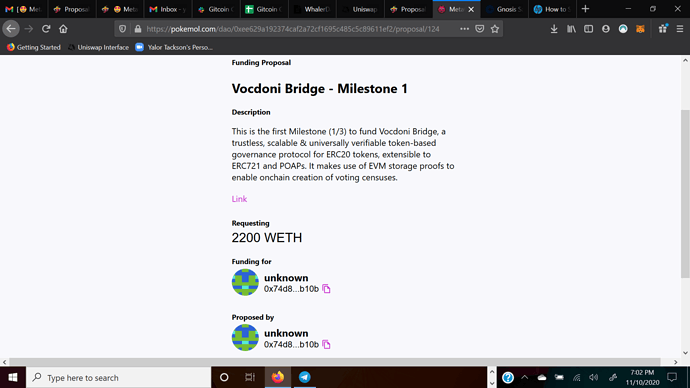Hello, find here our proposal to fund a token-based governance protocol. Feedback more than welcome! 
Vocdoni is a universally verifiable and anonymous voting infrastructure extensible to token-based governance.
Current status
We aim to make e-governance available to all while meeting the highest standards of sovereignty, security, accessibility, privacy, resiliency and traceability. To this end, we are leveraging the latest advances in cryptography, blockchain and distributed systems to develop an open source technology (Vocdoni Open Stack) to work as a L2 for governance.
We have developed the first ever trustless end-to-end (E2E) verifiable and anonymous voting system, which was designed from the start to be used from a smartphone, along with a distributed infrastructure that maximizes resilience, neutrality and transparency. We believe this combination can enable the mass-adoption of e-voting and make civil participation dramatically easier than ever before.
Highlights
- Our infrastructure currently allows up to 18 000 votes per minute.
- We have already organized important voting processes, such as an AGM including more than 180000 participants.
- More than 20 organizations are currently using Vocdoni Platform MVP.
- Vocdoni Platform is already available on different app stores.
- We have some integrations on the horizon, including aggregators.
- Our Voting Protocol is flexible and supports all sorts of voting, including quadratic voting.
- Vocdoni includes all kinds of privacy features, including anonymous voting with zk-SNARKs.
So far we have build two different products that make use of Vocdoni Open Stack:
- Vocdoni Platform : A smartphone app that allows users to follow and join organizations and stay updated on voting processes and communications. The App includes the necessary cryptographic primitives to allow users to create a self-sovereign identity, authenticate themselves and vote. On the organization side, there is a web manager that allows organizers to manage their organization profile, publish a news feed, manage censuses, host voting processes and visualize their results.
- Vocdoni Voting as a Service : VaaS gives anyone the tools to transparently integrate the voting services into their own systems through APIs.
Vocdoni also has a set of tools like the Vocdoni Explorer , a simple, easy-to-use web application which empowers voters and third-parties to interface with the Vochain at a higher-level. It enables anyone to view & verify the contents of Blockchain data (blocks and transactions) as well as human-meaningful records such as entities, processes, and vote envelopes.
Although our software is mainly focused on the traditional market, we are aware about the growing need in the crypto world for cheap, secure and privacy-centric governance solutions. That’s why we decided to build Vocdoni Bridge on top of Vocdoni Open Stack.
Proposal
Vocdoni Bridge
Vocdoni Bridge aims to improve the process of signaling/voting for the token holders of an EVM compatible token.
Given that is near to impossible to execute this process on-chain (due to gas costs and tx processing) Vocdoni Bridge offers a L2 scaling solution based on Tendermint that uses Ethereum or xDai as a source of truth.
Current existing solutions are:
- Centralized and completely trusted.
- Not taking into account user segmentation (census).
- Not able to tally the overall process autonomously.
- Not able to verify the correctness of the tally.
- Not able to trigger on-chain actions.
- Not scalable
- Unable to offer privacy to voters
Vocdoni Bridge improves on the current solutions by:
- Handling the logic of a signaling/voting process with a custom voting blockchain operated by trusted entities whose reputation is at stake. Each process can be externally verified.
- Enabling user segmentation using a Merkle Tree approach. A user can prove that they are included in a census by creating a Merkle Proof demonstrating so.
- Autonomously process and verify each signal/vote of a process. The results can be processed real-time or at the end of the voting process.
- Being able to trigger on-chain actions using an Ethereum-Tendermint bidirectional message passing component.
- Implementing an ongoing zk-SNARKs integration, thus making an anonymous voting possible
To achieve this we rely on the Vocdoni Open Stack infrastructure and add a few components to act as a bridge between token holders and decentralized verifiable governance. The most relevant one is the monitoring service that tracks holders and generates censuses of the accounts that hold funds of a given token.
These censuses are compatible with the existing governance infrastructure, no additional effort is required.
Future work lines
- Shorterm - The oracles deployed by Vocdoni can be replaced by a decentralized oracle system like Chainlink.
- Midterm - Add an Optimistic rollup mechanism to validate the results onchain.
- Longterm - Add support for zk-rollups to create a cryptographic proof of the results that can be validated onchain.
Vocdoni Bridge Architecture
A more detailed proposal overview is accessible here.
UI mockup files can be downloaded here.
Funding
To develop this project we ask for 6 500 DAI to cover the operational expenses of building a functional platform for token governance, both backend and UI. To be executed during Q42020.
These funds will allow us to:
- Develop a User Interface to allow users to vote, create votes and register tokens using web3 wallets.
- Develop a backend service to monitor the registered tokens and keep the census updated.
- Implement the first voting types available on the UI.
- Generate documentation and a strong knowledge base.
Team
Our team composes a group of people with different profiles. Developers, activists and entrepreneurs, including two PhDs, with vast experience in the world of computer security, decentralised technologies (hw&sw), management of common goods, communication and, naturally, software development.
Vocdoni Bridge will be led by the following members:
- Pau Escrich (Github): Vocdoni CTO. Software engineer and sysadmin. 4y in Academia as researcher on distributed systems and principal contributor of Libremesh.org and Guifi.net. Active in the blockchain world since 2012, developed and managed a mining pool in 2014 and built OSS tools related to Stratum protocol.
- Jordi Moraleda: Senior full-stack engineer. He is heavily involved in the architecture, research and integration of the components that make things possible. Integrated and validated zk-SNARKs on mobile devices to generate proofs within a matter of seconds. He is also in charge of the UI and smart contract components of the platform.
- Jordi Piñana (Github): Software developer with 4y of experience in Blockchain programming. He is also teaching at the Polytechnic University of Catalonia blockchain master’s degree program.
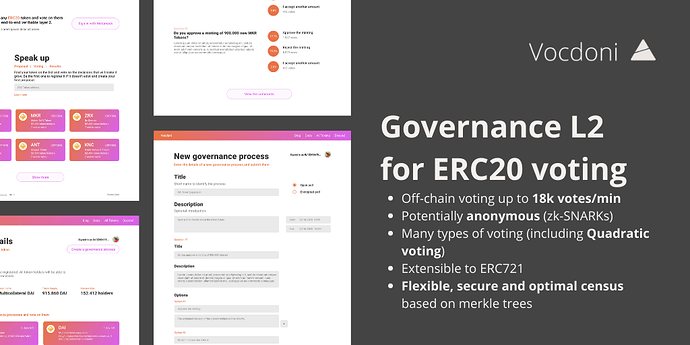
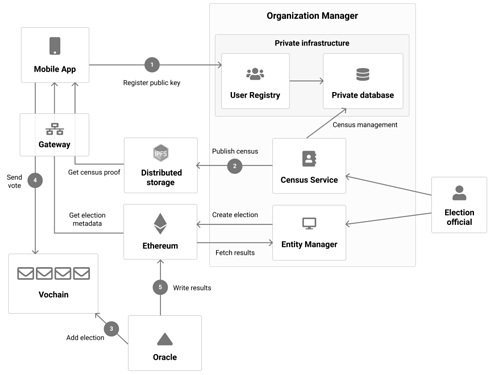
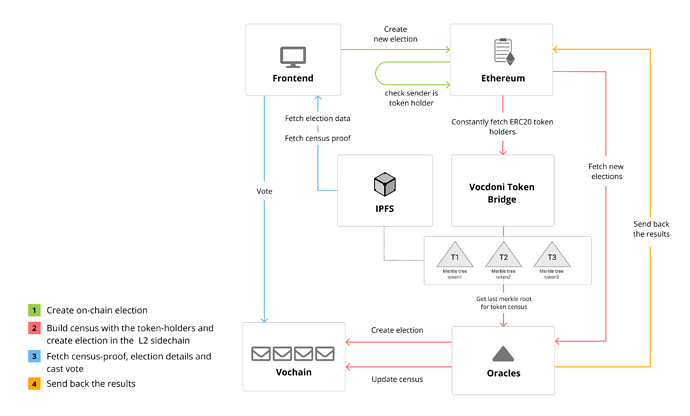
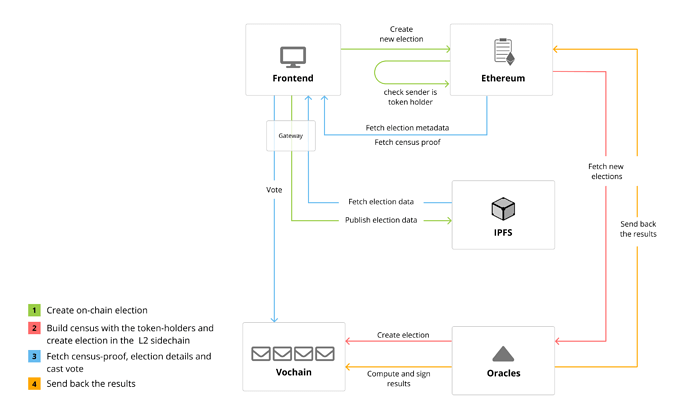
 please cancel and resubmit for $2200 equivalent !
please cancel and resubmit for $2200 equivalent !